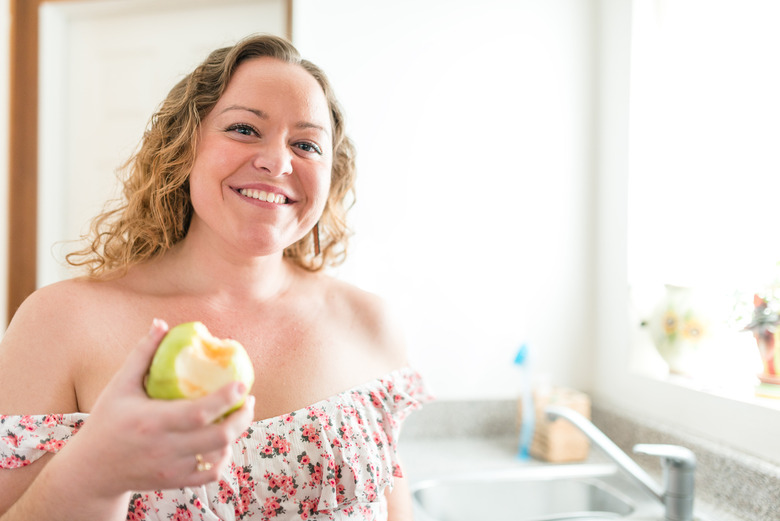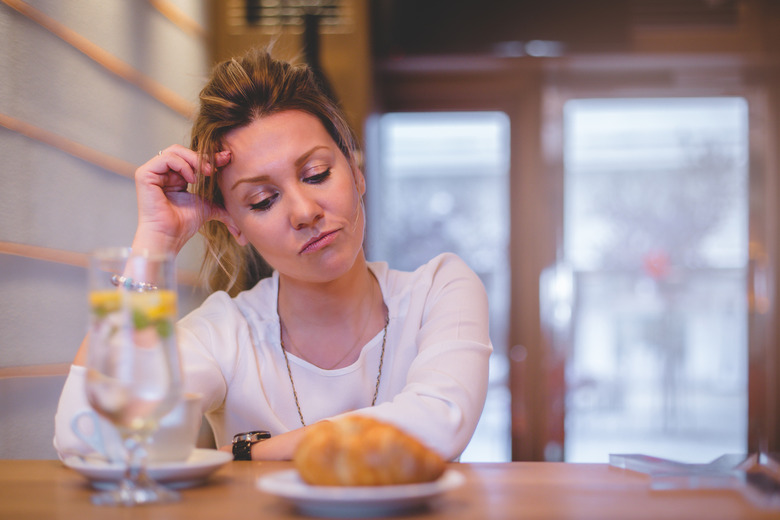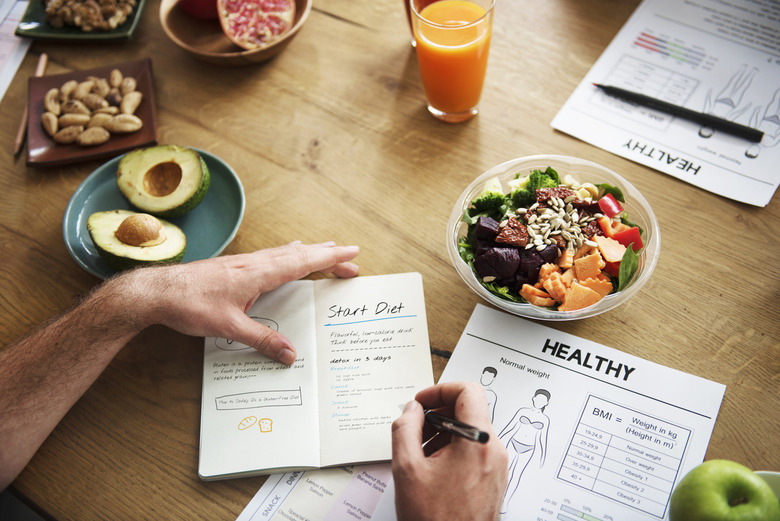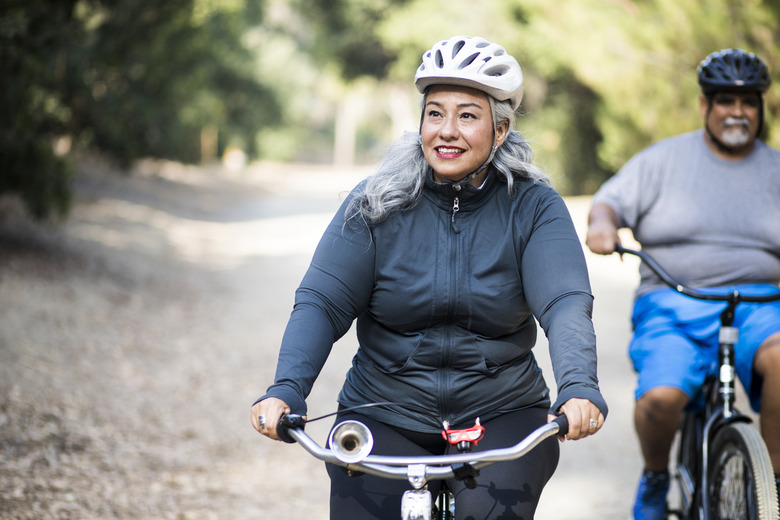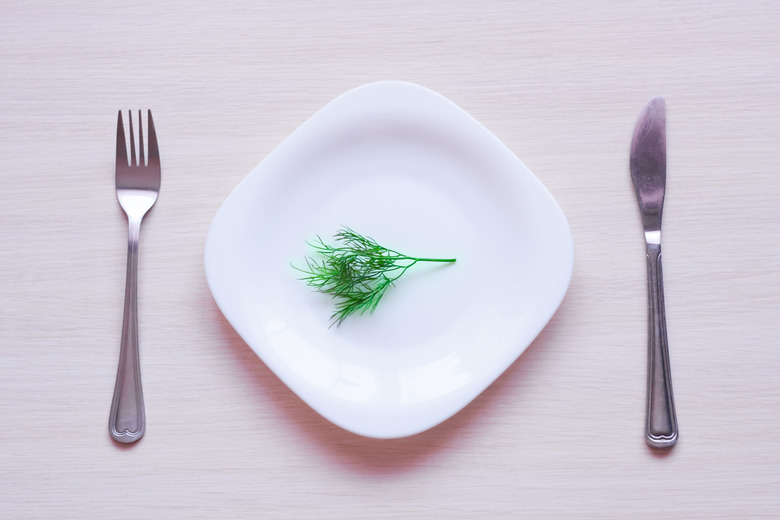How To Stop Feeling Insecure In Your Body Gallery
Feeling confident in your body might seem impossible right now. But we promise: Any person in any body can achieve it. People just tend to go about getting rid of their insecurities in unhelpful ways. Focusing only on parts of your body that you like, for example, might not work. If you like your arms because they're small, what happens if one day you wake up and wish they looked smaller?
The key is in accepting all bodies at any size. Body insecurity is really just what happens when you're afraid of fat. Think about it — if gaining weight was okay, if fat was okay, if not having the "perfect" body was okay, there would be no insecurity. There would be no reason to feel self-conscious about your body at all. The only reason our perceived flaws matter is because we think they are reflective of a greater problem.
If I don't have a flat stomach, people will think I don't work out enough. If I can't fit into a size whatever, people won't like me.
Sound familiar? Body size, on the surface, is just that. Body size. It's only once we tack on all these other judgments that it becomes an issue.
Of course, we live in a culture where all kinds of judgments and negativity are thrown on people in larger bodies. This phenomenon, called weight stigma, is everywhere and is inherently harmful. Studies have shown that weight stigma can decrease the quality of healthcare for people in larger bodies. It also can have a negative effect on people's health, resulting in medical and psychological consequences.
Weight stigma is a huge part of the reason why simple interventions to try to improve people's body image don't work. Tacking a Post-it Note reading "you're beautiful" on the mirror might help some people to feel a little better in the moment, but it doesn't exactly help to counteract the fat-shaming messages we've been receiving since birth. And since people exist in all types of bodies — fat, thin, tall, short — certain body types are put down no matter what.
With this limitation in mind, we consulted the advice columns of body positive activists, health experts, and professional health coaches to put together this list of helpful interventions to improve your body image. Hopefully, over time, these steps can help you to stop feeling insecure in your body once and for all.
Buy Clothes That Fit
Too many people keep or even wear clothes that don't fit them in the hopes it will motivate them to lose weight. Keeping or wearing clothes that don't fit you isn't motivating or worthwhile — the only thing it will give you is discomfort.
If you aren't comfortable in your clothes or choose tight-fitting clothes purposefully, you'll be consistently reminded of the body parts that don't fit. This can cause feelings of insecurity or shame. This is all avoidable! Buy clothes that fit the body you have now — you deserve to feel comfortable, no matter your size.
Stop Weighing Yourself
Checking the scale can provide a temporary feeling of comfort. You know that you are checking in on something that's making you anxious: your weight. But think about it. It's never a good experience. When you step on the scale, one of two things could happen. You either 1) don't like the number and proceed to feel terrible or 2) do like the number and end up afraid of gaining weight in the future. In both cases, you're making harsh judgments about your worth based only on that number. No matter if the judgment is positive or negative, it's fueling your insecurities and distress.
Look in Fewer Mirrors
Similar to how you might react to a number on the scale, you might react similarly to looking in the mirror. Just like you judge the number of pounds you weigh, you probably have a bunch of pent-up judgment about your reflection. Checking mirrors is serving a similar purpose — it's temporarily suppressing anxiety you feel about your body. It might help in the short term; you check the mirror, see that you haven't somehow ballooned overnight, and continue on your way worrying you will look differently tomorrow. Or, conversely, you look in the mirror, see a change that you don't like, and start hating on your body right away. But giving this fear of fat any power at all is harmful — you need to get rid of all of that from your mind if you ever want to feel at peace. You might consider eliminating full-body mirrors from your home or attending fitness classes in studios without mirrors. You'd be surprised at the difference it can make!
Make Food and Exercise Choices Independent of Weight
Pursuing weight loss isn't doing your body image any favors. People think that once they have the body they want, they'll feel more confident. But that's not necessarily true. Instead, when people do lose weight, many people experience a worse body image, or at least one that steals more influence over their lives. Weight loss, 97 percent of the time, is temporary; in fact, 60 percent of those who lose weight gain more weight back than they lost.
After the initial weight loss, our culture starts to reinforce that the person's weight loss was a positive thing. People tend to receive showers of compliments, queries into their secrets, admiration, and respect. These might seem like the very things that person wanted from their weight loss in the first place; but in actuality, these things can actually curb their self-esteem. A person may begin to rely on his or her body remaining at a smaller size to feel accepted and okay. As a result, some experience an intensified fear of weight gain — weight gain that's extremely likely.
Your best bet to stave off body insecurity? Stop pursuing weight loss. If you choose to pursue health, do so with a weight-neutral perspective. Exercise when it feels good. Eat the foods your body craves. Listen to your intuition and treat health problems with lifestyle interventions rather than weight loss. If you aren't sure how to do so, you might want to read into the research of Linda Bacon, Ph.D., whose work details an evidence-based method of practicing health that's entirely weight-neutral.
Don’t Let Others’ Insecurities Bring You Down
"Fat talk" is not your friend. "Fat talk" is any topic of conversation that involves shaming, berating, or punishing yourself for food choices or body size. Examples of this dialogue might be "I feel so fat today" or "I shouldn't have eaten those French fries with lunch." It's okay to have these thoughts, but realize that they are just thoughts — saying them out loud only makes them seem true. Avoid voicing your own insecurities about food and your body. If you hear others voicing theirs, realize that these statements are only reflections of their insecurities; you don't have to start feeling insecure, too.
Separate Yourself From Diet Mentality
For some, it can be helpful to separate the voices in their heads that come from diet culture from the ones that are truly their own. This can help you to think of these thoughts as something outside of yourself that you can more easily reject, rather than an absolute truth or belief. For instance, if you hear the thought "I can't ever feel confident wearing that," realize that that's not really true. You can. That's just the diet mentality sneaking into your brain and telling you that weight has control over your life. It's okay to challenge the diet mentality. Why can't you feel confident wearing whatever you want?
Let Go of the Blame
Since we live in a weight-focused culture, we're brought up being inundated with messages promoting dieting, fear of weight gain, and idealization of smaller bodies. This becomes internalized over time; the insecurities holding you back are a result of your upbringing. They're not a reflection of you and your inability to love yourself — it's not your fault you feel ashamed in your body! You've been trained to think this way from the time you were born.
A helpful exercise might be to think back to the first time you remember feeling insecure in your body. For most women in particular, this recollection is from early childhood. Eighty-one percent of 10-year-olds are afraid of being fat, according to some studies. Now recall why it was that you felt this way. What external messages were you receiving that made you feel insecure?
Stop Thinking of Certain Features as ‘Bad’
Break down your own judgments on bodies. Do you think of having a flat stomach as "good" and having belly rolls as "bad"? If so, of course you feel negatively about yourself if you don't have a flat stomach. You're assuming everyone else is making a judgment on you based on that bodily feature. But if you met a person on the street who didn't have a flat stomach, do you think it makes them any worse of a person? Attraction aside — people are attracted to all different kinds of bodies, depending on their preferences — you probably aren't bothered. Unless you've got some very strong weight bias of your own, it's probable that you judge the value of a person on other qualities — their sense of humor, talents, or empathy, for instance. Not having a flat stomach doesn't make you "bad." Why think of it that way?
Unfollow and Unsubscribe From People Who Bring You Down
Looking only at thin, young, white, able-bodied people all day long isn't going to help you get rid of your insecurities. And if you're trying to stop the dieting that's making you feel miserable, following paleo blogs and "healthy meal prep" email lists isn't going to help, either. The world is filled with a myriad of body types, dietary habits, and lifestyles. If seeing that one blogger's Instagram makes you feel badly about yourself, unfollow her! There's no need to submit yourself to even more insecurity than you already feel.
Diversify Your Instagram Feed
People feel uplifted when they feel represented in media. Racial diversity is important — this much we can understand. For this reason, many schools have attempted to diversify their curriculum. This is also part of the reason that clothing companies and Hollywood have been influenced to diversify their models and casts. But what about diversity based on size? More than two-thirds of Americans are considered overweight or obese, according to the National Institutes of Health. Little to none of the representation on television or in the fashion industry accounts for these body types.
Diversify the cast of characters in your Instagram feed. Exposure to images of all kinds of bodies — people in larger bodies, people of color, people with disabilities, etc. — can help improve your internal judgments of certain body types. It can also help you to find your own sense of body acceptance.
Appreciate Your Body for Things Other Than How It Looks
Cultivate an appreciation for your body that doesn't revolve around visual characteristics. Think of all the amazing things that your body does for you every single day. It helps you breathe. You can move, use it to exercise. You can lift things, walk to work, laugh. Write down five things you can thank your body for, regardless of how it looks, and refer back to it when you are feeling insecure. Remember that you don't need to feel negatively about your body at all — not when there are so many incredible reasons to be thankful for it.
Practice Sitting With Discomfort
When you feel insecure about your body, it's the opposite of comfortable. You might adjust your clothes or stop eating. You might worry about what people think of you or fall quiet at the dinner table. No matter your reaction, all of these things are attempts to alleviate discomfort. But eating less or withdrawing from social situations won't alleviate the discomfort you feel — instead, these things create new discomfort.
Instead, practice sitting with and tolerating the discomfort of feeling insecure — without doing anything to try and change it. Trust that the feeling will pass. Practice mindfulness and try to come back to the present moment. Focus on something else. Some people find it helpful to listen to music or meditate. Others cope with discomfort by getting outside or engaging in their hobbies. Find whatever coping mechanism works for you; when body image starts nagging at you, it'll be there to help you cope without making things worse.
Know That No One Is Perfect
You might feel like an absolute weirdo for feeling so self-conscious and thinking about your body all the time. But you are not alone. Because of the weight-focused culture we live in, it's nearly impossible to feel completely comfortable in your body all the time. Take comfort in knowing that many people feel this way and that even after your body image improves, there might be times when the insecurities come back. As you work on your body image as a whole, the negative thoughts will get less frequent.
Give Up On the Idea of Control
Just like it's not your fault you feel insecure, it's also not your fault that your body looks the way it does— whether you like how it looks or not. Weight set point theory describes a growing body of scientific research showing that humans might not all be in control of their weight; it also suggests that different bodies have different set point weights, or "ideal weights," depending on genetics, lifestyle factors, and dieting history. Studies conclude that attempts to control or regulate one's weight are probably not going to be effective. Giving up on controlling your weight will also likely be helpful in accepting it as-is.
Learn the Consequences of Dieting
Dieting is controversial — some argue that it has health benefits while others argue that these benefits are nonexistent. Regardless of whether you believe there are health benefits or not, it's impossible to deny that there are consequences to dieting. Some of these include increased anxiety around food, increased levels of stress hormones, distraction from your everyday life, potential monetary consequences, and lots of lost time.
There are also health risks from weight fluctuation — which is what will likely happen if you diet, regain the weight, and diet again. These include an increased risk of high cholesterol, Type 2 diabetes, and high blood pressure. Weight cycling can cause psychological consequences as well, in addition to heightened levels of the stress hormone cortisol after low-calorie dieting.
Of course, whether you diet or not is up to you. We're only here to tell you that if your goal is improving your body image, dieting will probably not serve that purpose. It also will have other negative side effects — worth considering before you make your choice.
Understand That Your Life Is More Important Than Your Body’s Appearance
Considering all those side effects we mentioned in the previous slide, it's worth thinking things over. Is it worth missing out on the money, time, and energy you put into trying to change your body? In pursuing body change, you sacrifice other valuable parts of life.
Let's take a moment to remember the function of even having a body in the first place: To serve as a vessel to allow you to live life. That's it! If your body is serving that purpose effectively, which is the real reason your health is important in the first place, you might not want to dedicate more of your life to your body's appearance.
Know That Your Body Size Has Less Power Than You Think
Weight gain might seem like the end of the world. But it's really not. The only reason weight is such a big deal in your own life is because of your thoughts about it. When you lose 10 pounds, you still are going to have the same job, relationships, success, intelligence, passions, etc., that you did when you were 10 pounds heavier. And vice versa.
Remind Yourself of Your Values
Say you're in a larger body. You might be afraid that people around you are judging you or will like you less. But is that why you value your relationships? Do you value people because they admire the way that you look? Or do you have relationships with more substance? If there are people who like you less based on your appearance, do some real thorough thinking over whether that's a friendship you want to pursue. If your values are elsewhere, you don't need those people to dictate how you feel about yourself — or your body.
All this being said, there are ways to focus on health without criticizing the way your body looks. Consider making small but healthful dietary choices because they feel good — not because of how they might affect your weight.




